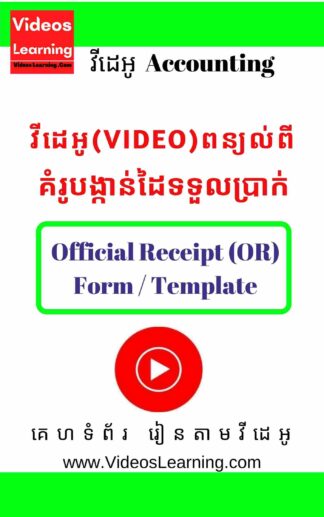Video ពន្យល់ពី ៖ Types of Accounting Documents ( ឯកសារគណនេយ្យមានអ្វីខ្លះសម្រាប់អនុវត្តការងារជាក់ស្តែង? )
$4
ចុច ទីនេះ ដើម្បីមើល Videos បង្រៀនបន្ទាប់បង់លុយរួច
ប្រភេទសំខាន់ៗមួយចំនួននៃរបាយការណ៍ដែលប្រើប្រាស់ក្នុងការគ្រប់គ្រងគណនេយ្យមានដូចខាងក្រោម៖ 1. Cash Memo: ការលក់ និងការទិញគឺជាចំណុចលេចធ្លោបំផុតនៃប្រតិបត្តិការពាណិជ្ជកម្មណាមួយ។ សម្រាប់ការកត់ត្រាកិច្ចព្រមព្រៀងជាសាច់ប្រាក់ និងការទិញជាសាច់ប្រាក់ អនុសរណៈសាច់ប្រាក់បម្រើជាឯកសារប្រភព។ ការរំលឹកសាច់ប្រាក់អាចជាបណ្ណសារប្រភពដែលការផ្លាស់ប្តូរទាំងអស់ទាក់ទងនឹងកិច្ចព្រមព្រៀងសាច់ប្រាក់ ឬការទិញនឹងត្រូវកត់ត្រា។ នៅពេលដែលទំនិញត្រូវបានទទួលដោយការខិតខំប្រឹងប្រែងពាណិជ្ជកម្មនៅលើមូលដ្ឋានសាច់ប្រាក់នៅចំណុចនោះ ក្រុមហ៊ុនទទួលបានការរំលឹកជាសាច់ប្រាក់ ហើយនៅពេលដែលពាណិជ្ជកម្មផ្តល់ផលិតផល វាផ្តល់ការជូនដំណឹងជាសាច់ប្រាក់ ដែលនៅក្នុងនោះធាតុទាំងអស់នៃការផ្លាស់ប្តូរទាក់ទងនឹងការទិញ ឬកិច្ចព្រមព្រៀង viz ។ ចំនួន ឬចំនួនទឹកប្រាក់ដែលបានទិញ/លក់ ថ្លៃដើម ការបង្វិលសងដែលទទួលបាន ឬអនុញ្ញាត ហើយការវាយតម្លៃដែលប្រមូលបាន ឬរក្សាទុកត្រូវបានផ្តល់ឱ្យ។ នៅលើមូលដ្ឋាននៃអនុសរណៈសាច់ប្រាក់ ការផ្លាស់ប្តូរទាំងនេះគឺនៅចំណុចនោះដែលត្រូវបានកត់ត្រានៅក្នុងសៀវភៅគណនី។ នៅក្នុងការពិនិត្យឡើងវិញ កាតព្វកិច្ចចម្បងរបស់អ្នកវាយតម្លៃគឺត្រូវបញ្ជាក់សៀវភៅប្រាក់ដោយយោងទៅលើប័ណ្ណទូទាត់ប្រាក់។ 2. បង្កាន់ដៃ និងវិក្កយបត្រ៖ វិក្កយបត្រ ឬការគិតថ្លៃកត់ត្រាការផ្លាស់ប្តូរឥណទានដែលទាក់ទងនឹង
A few of the vital sorts of Reports Utilized in Bookkeeping are as follows: 1. Cash Memo: Sales and buys are the most highlights of any trade undertaking. For recording cash deals and cash buys, cash memos serve as source documents. Cash reminder could be a source archive in which all exchanges relating to cash deals or buys are to be recorded. When merchandise are obtained by a commerce endeavor on cash premise at that point the firm gets cash reminder and when a commerce undertaking offers products, it gives cash notice, in which all subtle elements of the exchange relating to the buy or deals viz. number or amount purchased/sold, cost, rebate gotten or permitted and deals assess collected or stored are given. On the premise of cash memos, these exchanges are at that point recorded within the book of accounts. In review, the foremost obligation of the evaluator is to confirm money book with reference to money vouchers. 2. Receipt and Bill: Invoice or charge records the credit exchanges related to



